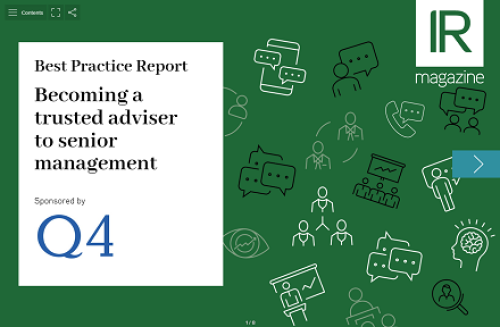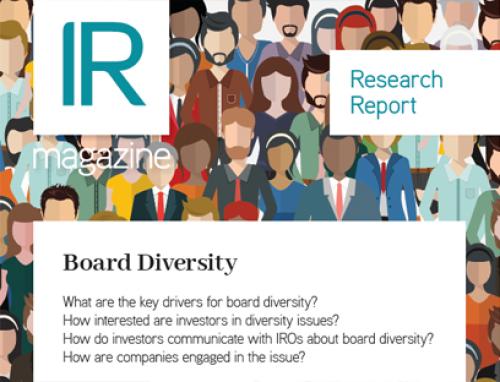Janet Dignan looks at some of the institutions offering IR degrees or certification across the globe
Surveys of investor relations professionals around the world – including those conducted by IR magazine – repeatedly show enormous variety in their educational backgrounds.
IR is, by definition, an interdisciplinary function, so some IR professionals have degrees in finance and accounting or MBAs, while others have gone the communications route.
The IRO ranks also boast masters and mistresses of chemistry, geology and IT – now doing a fine job of explaining developments at chemicals, mining or technology companies to equally well-qualified research analysts in investment banks.
But what are the options for those who either have their hearts set on a career in IR from an early age (such specimens do exist) or who find themselves on the job market with a liberal arts degree and no obvious vocation but a broad interest in both the capital markets and communications?
Are there pre or post-graduate options for them to study investor relations, or do they have to opt for either the communications or finance route, in the hope they will later be able to add the other requisite string to their bow?
As with so many things in the IR world, North America is the trailblazer. Last year, for instance, saw the launch of what Fordham University in New York – and we here at IR magazine – believe to be the first master’s of science degree in investor relations. That’s distinct from the MA in investor relations available at the University of San Francisco (USF).
The following survey of some of the academic options in the field of investor relations doesn’t pretend to be comprehensive, but it does aim to give a flavor of what’s on offer or on the horizon, including some of the programs from national IR associations, without academic involvement.
Graduate School of Business, Fordham University
Fordham’s MSc in IR (MSIR) was launched in the fall of 2011, so those in the first cohort have not yet completed their study. The program lasts for four semesters – a total of 16 months – during which students work for one three-day weekend (Friday to Sunday, 9.00 am–5.00 pm) a month.
Fordham MSIR: 2011 class profileMean age: 27Average work experience: 4.5 years Percent male: 65 Percent female: 35 |
Most of the 23 students on the inaugural program are working in IR, although this is not a prerequisite. Officially, the Fordham MSIR program was created specifically for ‘experienced business executives seeking advanced training in investor relations for enterprises that are already publicly traded or which are preparing for initial public offerings; individuals seeking a career path in investor relations who have prior business or PR experience; and recent university graduates with bachelor’s degrees in IR-related disciplines, including accounting, finance, IT, communications, language studies, marketing and law.’
Although prospective students are expected to have an undergraduate degree in either business or communications, other degrees will be considered on a case-by-case basis. Students must also meet Fordham’s general Business School admission requirements.
Fordham MSIR: program componentsOrientation: perspectives from real-world practice. Prerequisite courses offered as neededFall term (nine credits): principles of modern finance; financial statement analysis; the media and communications industries Spring term (12 credits): corporate governance; global financial markets: concepts, functions and trading; legal issues in business organizations; financial reporting Summer term (nine credits): global industry analysis and strategic planning; corporate and securities law; IT for investor relations; symposium on the ethics of IR I Fall term (nine credits): web technologies; communications and PR concepts: IR; ethics of IR II; two electives More info: www.bnet.fordham.edu/academics/ms_programs/ms_investor_relations/index.asp |
The only other prerequisite is that students have taken classes in basic finance and basic accounting as undergraduates. Those that haven’t will have the opportunity to take these two classes either during the summer session before the course starts or through an online program.
Associate dean Francis Petit says there has been a lot of interest in Fordham’s new MSIR course. ‘This is the first to be offered at a business school, and it’s very attractive to people wanting to move up the IR chain,’ he explains. ‘The students take the academic journey together.’
The curriculum itself covers basic skills in accounting and investment, relevant IT, ethical aspects, communications fundamentals across a variety of media, the legal environment, and strategic relationship management and communications.
San Francisco’s MAIR
Meanwhile, on the other side of the US, the USF offers an MA in IR (MAIR). This was launched in the fall of 2009, so it predates Fordham’s master’s degree, but like Fordham’s it is taught within the university’s business school, or School of Management. The university claims to provide ‘a unique combination of financial, marketing and legal expertise with public relations skills.’
The MAIR is a modular program that seeks to integrate the quantitative training required by the financial profession with solid grounding in the ethical behavior required in the financial markets and transactions. There’s a particular focus on the skills embodied in and required for the chartered financial analyst designation, which, the university says, enhances the credibility of an IRO.
USF MAIR: stated goals-To train the student in a combination of financial expertise and public relations skills.-To develop the student’s expertise in shaping market perceptions of a corporation’s results and prospects. -To guide and train students to become knowledgeable and personable communicators to individual investors, investment professionals and regulators. -To provide analytical foundations to help the MAIR student collect and convey information to company officers on investor perceptions of the industry, the company and competitors. More info: www.usfca.edu/management/mair |
The MAIR program is a year long, starting and finishing in August, and is split into three semesters. The first two semesters involve 12 hours a week in class; the third reduces to eight so that students can take up internships concurrently.
‘There are two sides to the program: the financial side and the IR/marketing side,’ explains Barbara Domingo, the associate director of the program and vice president of education for NIRI.
‘The faculty includes a mix of university professors and professionals from local companies. The finance and accounting courses are typically taught by university professors; the IR, marketing and legal courses are typically led by practitioners, including attorneys.’
The program requires students to have completed fundamental courses in microeconomics, macroeconomics, accounting, and probability and statistics to be eligible for unconditional admission.
Those with undergraduate degrees in economics, business, finance or accounting will usually have undertaken enough courses as part of their major to satisfy the foundation requirements.
Students without such degrees may still be admitted conditionally, but they will then have to complete the missing foundation courses before beginning the MAIR.
Domingo says the classes are usually very mixed, in terms of nationalities, with this year’s applicants coming from China, Egypt and Saudi Arabia, for instance.
‘Last year’s cohort were all Chinese, however,’ she reports, with some surprise. On graduation, some of them went back to China with their new master’s degrees, while others remained in the US. There is an intake of up to 15 students a year, and they typically have at least a year’s corporate-level business experience as well as ‘a strong desire to communicate with finance professionals’.
So how does Domingo measure the success of the program? She says it’s all about how many of the students get jobs at the end. ‘Everyone from the first cohort found jobs, about two thirds of them as IROs,’ she reports. The rest took up positions in closely related areas, such as on the sell side or in investor relations consulting firms.
CIRI & Ivey
In Canada, CIRI worked with the Richard Ivey Business School to establish an Investor Relations Certification Program which launched in the fall of 2010.
Ivey is the business wing of the University of Western Ontario (or Western University, as it recently rebranded itself) and Stephen Foerster is professor of finance there, as well as being the man in charge of the new program.
As he says, this may be the first certification program but it’s certainly not the first IR teaching Ivey has engaged in. Short courses have been offered in IR for some time but more recently people like Tom Enright, chairman of CIRI, and others got together with Ivey to develop an appropriate curriculum for a course leading to a qualification.
Students wanting to enrol on the course have to meet one of three sets of requirements. They can have at least three years’ IR experience, during which at least half of their time was spent on investor relations; four years of related corporate experience, with participation in CIRI’s Essentials of IR program within the past five years; or four years of combined experience in investor relations and a related field, with participation in CIRI’s Essentials of IR program within the past five years. Such ‘related corporate experience’ may include finance, communications, marketing or capital markets.
The course itself lasts a year and Foerster describes it as a unique approach to teaching. The program is ‘book-ended by face-to-face classes’ (see The CIRI/Ivey Investor Relations Certification Program, below) but during the course of the year there are additional sessions every three weeks.
The CIRI/Ivey Investor Relations Certification ProgramThe program: three days in-class in Toronto in September; 12 online sessions over 10 months; a two-day class at the CIRI Annual ConferenceCost: $8,950 for CIRI members; $9,450 for non-members |
These involve the students – there are 30 on this year’s roll – watching a two-hour video that leads to written assignments, and engaging in a one-hour live discussion. Teaching is done predominantly by faculty from Ivey, but with a lawyer for legal and regulatory aspects.
Having completed the course, students are eligible to take the examination for a nominal fee and become a certified investor relations professional.
The CIR from the IRS
On the other side of the Atlantic, IR education is typically less comprehensive, more often taking the form of a series of short courses and/or home study followed by examinations and leading to some kind of certification rather than a university degree.
The Certificate in Investor Relations (CIR) from the UK’s Investor Relations Society (IRS), for instance, is a well-known entry-level qualification that is now available not just in the UK but also in Hong Kong, Malaysia Russia and Singapore.
Students have to take a one-hour examination made up of 60 multiple choice questions based on a syllabus covering five key areas: introduction to IR; companies and regulation; financial markets; the regulatory environment; and accounting valuation and investment principles. Students study these with the aid of a study guide, which they receive on registering.
Fees are £430 ($693) for members of the IRS or £545 for non-members; this covers, in addition to the study materials,
the option to do a mock online exam (as often as desired) and a one-day revision course. There are no mandatory classes, so students can complete the whole program with about 40 hours’ study. If they remain hungry for further education, there’s CIR+ available from the IRS. This involves three further courses: beyond the traditional investor; achieving your potential; and writing & presentation for IR.
Continental European courses
The UK’s universities do not, however, offer any degrees in IR, nor do Germany’s. ‘We have nothing like that,’ says Magdalena Moll, the award-winning IRO at BASF in Mannheim who is also president of DIRK, Germany’s professional IR body.
For Moll, the problem with trying to teach IR is the range of areas that need covering. ‘It’s not just finance and accounting – you have to be able to write well and speak well,’ she explains. ‘You have to be good at strategy. There are so many different aspects.’
Nevertheless, DIRK does offer a modular course that leads to the investor relations officer certificate, or CIRO. The part-time course, which is conducted in cooperation with the Frankfurt School of Finance & Management, was developed under the supervision of experienced IR specialists.
DIRK’s CIROProgram runs: April–December; September–MayLocation: Frankfurt Modules: basic principles of investor relations; the capital market; financial reporting and analysis; the legal framework of investor relations; communication More info: +49 40 4136 3960 www.dirk.org/CIRO.html |
The teaching is done by a combination of academics from the Frankfurt School and practitioners, including Moll. The focus of the training program is on teaching broad, basic IR knowledge, and the course is verified by a certificate after passing a final examination.
The five modules making up the CIRO training course cover: basic principles of investor relations; the capital market – features and tools; financial reporting and analysis; the legal framework of IR; and communication – forms and tools.
DIRK says the course does not aim to make the participants experts in all areas, but is rather intended to provide basic knowledge and give an understanding of the connections between the individual subject areas.
The programs run twice a year, starting in either April or September. A student beginning in April would take one module a month, each requiring attendance at two days of classes held on a Friday and Saturday and including papers to read and home study totaling about 10 hours a month. When the classes end, in October, students take a written test followed by an oral exam in December.
The all-in cost for the program is €9,500 ($12,400) for DIRK members and €11,000 for non-members. This is typically paid by employers, since most students are already working in the IR field.
DIRK’s CIRO course is well respected – so much so that it has been copied as far away as the United Arab Emirates, where the Middle East IR Society (ME-IRS) has established its own version of CIRO, based on DIRK’s example (see ME-IRS: the UAE’s CIRO, below). THE ME-IRS has chapters in Bahrain, Kuwait, Palestine, Qatar and the UAE.
ME-IRS: the UAE’s CIROProgram runs: six monthsLocation: UAE Modules: legal and regulatory framework; results reporting and analysis; essential IR activities; communication; company valuation Launched: 2010 Number of students to date: 29+ More info: www.me-irsociety.com/ciro-1.php |
Looking east and ahead
Moving to Asia, we come full circle and back to Fordham, as the New York university has recently signed on to a joint program with Peking University. David Gautschi, dean of Fordham’s Graduate School of Business Administration, and other Fordham officials joined a delegation to the university in Beijing earlier this year.
During the visit, Fordham and the National School of Development of Peking University agreed on the third joint degree program between Fordham and Peking University, this time an MSIR. The two institutions celebrated with a joint alumni reception at the Shangri-la Hotel in Beijing.
Ho-Mou Wu, executive vice president of the Chinese school, talked about ‘building on the oasis of our past successes’ and said that the National School of Development treasured the friendship and partnership with Fordham.
Jeffrey Tian-Jing, one of the alumni and now in investor relations at China COSCO, emphasized the importance of the MSIR degree.
The new MSc launches in the fall in Beijing, where most of the teaching will take place. Students will, however, spend one semester in New York at Fordham. Petit expects most of the students to be Chinese professionals, working full time in IR or associated areas.
It seems IR, like so many other fields, is becoming at once more globalized and more professional. That can only be a benefit for companies, investors and the market economy in general – not to mention for IROs everywhere.
Other programsUniversity of California, IrvineA professional development program in partnership with NIRI offering the chance to earn a seven-course university certificate that can be completed entirely online. More info: http://unex.uci.edu/pdfs/brochures/INVESTOR_brochure.pdf University of Michigan Theory and practice of investor relations NIRI-backed course More info: http://execed.bus.umich.edu/Programs/Theory-and-Practice-of-Investor-Relations.aspx NYU School of Continuing and Professional Studies Certificate in investor relations NIRI-backed course More info: www.scps.nyu.edu/areas-of-study/public-relations/professional-certificates/investor-relations.html Maximus Connections, Singapore IRPAS Seminar Series More info: www.maximusconnections.com/Investor_Relations.php FIPECAFI, São Paulo, Brazil MBA in finance, communications and IR IBRI-backed degree More info: www.fipecafi.org |










